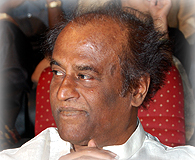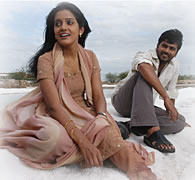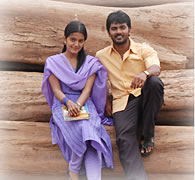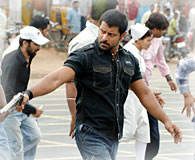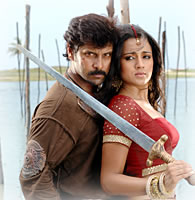| Kuselan- Super Star's next film | ||
| By Behindwoods News Bureau. | ||
| January 14, 2008 | ||
| ||
Rajnikanth has ensured to sustain the exhilaration among his fans by featuring in a film to be produced by Kavithalaya and directed by P Vasu. |
Tuesday, January 22, 2008
Kuselan- Super Star's next film
Pidichirikku
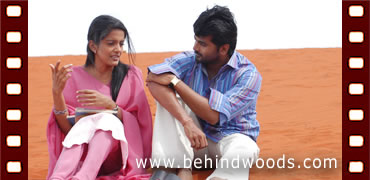 | |||
| |||
Director Kanagu, erstwhile assistant director to Linguswamy, debuts with Pidichirukku for producer Senbagakumar. Incidentally, Kanagu assisted Lingusamy during the making of the much-delayed Bheema that is now making it to the theaters alongside Pidichirukku. The movie stars Ashok as the hero (in his second film, after the average grosser Muruga) and debutant Visaka as the heroine. | |||
| |||
| |||
| |||
| |||
Bheema Movie Review
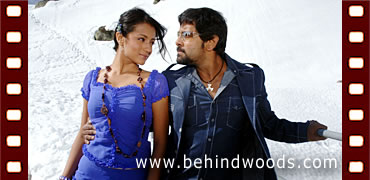 | ||||||
| ||||||
Bheema became one of the longest awaited Tamil movies of recent times not just for the hype it created but also for the time it took, from completion to release. And when a movie is usually this delayed, the hype and hoopla surrounding it fizzles out, but Bheema only became bigger with expectations rising with each passing day. There are several reasons for this: One, this is Vikram’s first movie after two years. Two, Vikram and Trisha pair up for the first time since the extremely successful Saami. Three, Bheema is Lingusamy’s follow-up to the stupendously successful Sandakozhi. And four, Harris Jeyaraj’s soulful songs. But here’s the lowdown: in spite of all the above reasons, the movie doesn’t quite live up to its colossal hype. | ||||||
| ||||||
| ||||||
| ||||||
Ahmed Khan’s choreography is understated and tasteful. Harris Jeyaraj’s music, of course, is very good. Unfortunately, some of his songs are inappropriately placed in the film, taking away some of the luster. However, “Oru Mugamo” and “Ragasiya Kanavugal” are memorable numbers that are also shot beautifully. For pure lovers of action, Bheema might just be the Pongal movie they are looking for, but those expecting an action movie with a strong story will be disappointed. | ||||||
Strangers

| ||||||
| As per the self- explanatory title, the film is a thriller-sort, involving two people who meet each other for the first time. So you have a suited, stiff-smiled Mr Rai (Kay Kay Menon, superbly restrained), and a floppy haired guy Rahul (Jimmy Shergill, chubby), talking psychology mumbo-jumbo, like how writing is like going to the loo, because both are a release of pressure. They should have named this film stranger, for one is yet to hear stranger dialogue. As they keep talking, cautious at first, they eventually pour out each other’s hearts and tell their sad stories. Rai had a fairly happy marriage, but his six-year-old son tragically died in an accident. The incident took an irreparable toll on his marriage. Rahul, a flop writer, who refuses to get a job, is going through wedding turmoil as well, and they both want out, but how? So they hatch a sinister plan to free each other of their dreary lives. It’s bizarre, because both seem educated, and there is no talk about how they’ll be able to escape the law. Still, you might be tempted to sportingly ignore such details and concentrate on what might happen ahead. Then come the mandatory twists and turns at a speed faster than the train the two were traveling in. To give the script its due, some of the surprises are truly riveting, and makes you want to know what’s next. There are some interesting moments through the film; and issues sensitively handled, like the breakdown of an otherwise-loving marriage is shown to be nobody’s fault, only unfortunate circumstances. You do end up liking bits of the movie, especially for Kay Kay Menon and Nandana Sen. Menon is superb, as always, and plays the challenging character, with several ranges, perfectly. Nanadana Sen looks lovely and is a natural onscreen, with a great voice, modulated well. She’s a pleasure throughout. Shergill has always been a competent actor, and some of his performances in films like Yahaan and Haasil were truly note-worthy. But here, he disappoints. All through the train trip, Rahul is supposed to be a bit of a mysterious character, but Shergill looks too harmless to carry off the sinister in the written role. Dare I say, he looks too boring. And confusing. For we are to believe that he lives in London, but with his shiny gold chain, faux-blonde hair that keeps hovering over his eyes, and a million gem-stoned rings in one hand, he’s made to look more like a Bhatinda munda trying to look kewl, and that’s an annoying distraction. More attention should have been paid to his styling, especially since most of the story hinges on him. Both the special appearances, by Sonali Kulkarni and Kitu Gidwani (nice to have her back), make a mark. Debutant director Anand Rai’s story has more holes than a fishnet, but he has strengths too, like sensitively portraying a new-age lookout to relationships and love and strong technical skills. The camera-click technique has been used to take us to and fro the flashbacks, but that gets repetitive after a while; the use of colour and black& white is immersing, without going overboard. Photography is very good, exceptional at places (Manoj Gupta). The music is fairly melodic with lyrics by Javed Akhtar and a nice hummable song by Lata Mangeshkar. The film is recommended for a lazy holiday watch; don’t expect an edge-of-the-seat thriller, and don’t expect a syrupy romance. The ride, otherwise, is fairly engaging. Verdict: Two stars |
Welcome

| ||||||
There are some films where you know exactly what to expect—this one gives you nothing more and nothing less. It’s one of those films where underworld bhais are cuter than bunnies, and about as harmless, where there are about a hundred excuses for a song, glam unlimited in the form of the pretty heroine, and where the goofy gags make you laugh despite yourself. They are not asking you to expect a plot and depth in the film, so you’d be foolish to demand plausibility in the plot. Also would be silly to object to the glorification of crime, and to the strange old-world system where marriages are fixed without even informing the potential bride and groom. The story is such: Rajeev is a perfect marriage material bachelor, the kind who is well mannered and has a way with kids. Rajeev’s uncle Dr. Ghungroo (Paresh Rawal, dependably competent) wants him to get married to a family with an impeccable sharafat track record, and is finding it impossible to find such a doodh-ka-dhula-hua family. As irony would have it, Rajeev ends up being saved from a massive fire by Katrina Kaif’s Sanjana (a favourite on-screen name these days), the sister of the city’s most feared don Uday Shetty. Unknowingly, he falls in love even faster than his burns heal. They have freak meetings, you know, where coincidence and a weak script keeps bringing them together. And the story progresses with a million other tiny ones hovering about the main plot, one involving a fake film shoot and a Godfather-type RDX’s (Feroze Khan, apt) loony son. The stretched climax of the film is a roller-coaster ride, going a bit too fast. You’re so busy catching your breath, you just can’t stop to have fun. Welcome is a victim of too many sub-plots suffocating the wacky, simple story, that otherwise had immense potential to be fleshed out for laughs. But for some reason, out mainstream comedy filmmakers believe that unless you stuff the audience with as many gags as you can fit and some more, the film won’t be found funny enough. The storytelling technique is archaic, where each character is literally introduced to the viewer – example, “Yeh Hai Uday Shetty, Sanjana Ke Bhai”, as the voiceover goes on to explain how the don is actually a closet actor, etc. You remember this technique from the David Dhawan films and one hoped this boring, over-simplistic storytelling style was done away with. Dialogue ranges from the above average to the superb. There are some truly witty lines in the film, that won’t just make you laugh, but you’ll remember them as well. Technically, the film is a letdown, and again a bit outdated. Welcome lacks the finesse of our films today, where even if the story disappoints, the cinematography, sync sound, editing and stylistic narration are superlative. Here, the film is dubbed, and done in the old school way. The film is punctuated by boring songs that are just there, not justified. One song, by Himesh Reshammiya, even has unpolished computer graphics of fire popping up all around (they met in a fire, remember?). Then there’s the other yawning cliché of a beach song, where the protagonists are singing some inane Hindi lyrics, with lots of foreigners in bikinis forming the background. Music directors Sajid-Wajid, Himesh Reshammiya and Anand Raj Anand haven’t been able to whip up anything memorable save the title track. The film is set in Dubai, by the way, like producer Nadiadwala’s several films in the past, and the location has been unimaginatively shot. What works for the film is simple—its sparkling, superb cast. Nana Patekar as Don Uday Shetty is a laugh-riot as is Anil Kapoor as Don Majnu. Cast together for the first time since Parinda, their comic timing complements each other perfectly, and together, they’re an incredible treat to watch. Truly, these two talent powerhouses hold the film on their able shoulders. Even the supporting cast, comprising talented, known faces, like Vijay Raaz is superb. Akshay Kumar is likeable, but is clearly overshadowed. Katrina suits the role and sports her uniform look of short skirts, cascading long hair and blinding lip-gloss. Mallika Sherawat does well in her short screen time, though her character is an interesting one. So at the end of it all, is Welcome funny? Yes, and it encapsulates all kinds of humour, from the objectionable, cheesy derogatory gay jokes, to genuinely funny one-liners. Not as blasé as director Anees Bazmee’s No Entry, this one’s an attempt at slightly more refined humour. You’re welcome to watch the film (excuse the obvious pun), if you can ignore some of the implausible, impossible situations, and choose to concentrate on Nana-Anil’s crackling comic chemistry. 2 1/2 stars (essentially for Nana Patekar and Anil Kapoor) |
Taare Zameen Par

| |||||||
| Sonia Chopra |
| It’s difficult. To spin a sensitive, imaginative yarn about a special child, and yet avoid ODing on the mush quotient. Here you have a breezy, entertaining and touching tale about eight-year-old Ishaan Awasthi (Darsheel Safary) and his miserable life. The other kids bully him, while the insensitive bus conductor calls him yeda. His parents (Tisca Chopra, Vipin Sharma), while concerned, are short on patience, and lose their cool ever so often. All this because he can’t read and write the way kids his age normally do, and is accused of being lazy, naughty and irreverent by a world that knows no better. More than alphabets and numbers, this gutsy little fellow is fascinated by everyday mundane things like a man throatily gulping down a bottle of water, or a stray pup yawning. No one understands this budding painter’s condition, that he is suffering from dyslexia. But then, how many of us really know of dyslexia in-depth? This is a condition, we are informed in the film, that affects not just our tiny protagonist, but also had in its grip Albert Edison, Leonardo Da Vinci, and closer home, Abhishek Bachchan. A load is lifted off Ishaan’s chest on knowing that such greats went through the same suffocating grief that he now finds impossible to bear. This golden piece of information, Ishaan’s bridge of hope, comes from the new art teacher in school. Unconventional, challenging rules, and spike-haired, Ram Shankar Nikumbh takes Ishaan under his wing, and recognises the potential the frightened boy holds and hides. Films made on the teacher/mentor-student relationship are not new (Black, Sur, Mona Lisa Smile, Freedom Writers). They follow a set road wherein the teacher rescues the underdog kiddo, and a lifelong bond is formed. TZP also follows a similar route, but you’re absolutely willing to forgive that. Perhaps because of the simplicity and frankness of the storytelling, completely devoid of distracting technical frills. The film does well on all counts, including cinematography, sound and editing, but it doesn’t try to impress the viewer. And that’s really a proof of the confidence of Aamir Khan as director. Also note-worthy is the pace, which he’s kept languorous, and it works. Khan uses animation several times in the film, and it’s always a playful delight, never overdone. In fact the simplicity reminds one of Iranian filmmaker Mohsen Makhmalbaf’s films, especially Children of God. Music (Shankar-Ehsaan-Loy) is omnipresent almost throughout the film, which gets a bit grating. The songs that leave a mark are the tile track and another fun number called Bheja Kum. The only grouse is that many topics are just skimmed over, while one was looking forward to the film thrashing them out (details on Ishaan’s dad, Ram Shankar’s childhood memories, the pressing truth of parents burdening kids with their own ambitions etc). Plus everything, after a point happens too smoothly; the opposers become supporters, and life is sunshine. Probably not the truth for many special children, for whom the mountain of struggle is not that easily overcome. Darsheel Safary is a real discovery. It’s mind-boggling how he manages to perform this intricate role with such effortless command. Aamir Khan is wonderful as always, and is obviously delighted to sink his teeth into such a different role, while also managing the creative reins. Tisca Chopra is fabulous, while Vipin Sharma’s a bit over-the-top. If you have kids, or nephews and nieces, or are just nuts about children anyway, you’ll hear the heartbeat of this film that much more clearly... Once you watch the film, and that you should do, don’t be in a hurry to leave; save a few minutes for the touching real-life footage of kids in the end as the credits roll. TZP is not just a tribute to this special boy’s character, but to all children – the stars that Khan hopes will not get lost between us cynical adults. Verdict: 3-and-a-half stars out of 5 |
Khoya Khoya Chand

| |||||||
| This could well be Sudhir Mishra’s first truly mainstream film, his formal introduction to the aam audience. A well-deserved one at that, for the director has made some of the most riveting films over the past few years (Is Raat Ki Subah Nahin, Hazaaron Khwaishein Aisi, Chameli, not Calcutta Mail). And he’s indefatigable, thank god. Special: Shiney & Soha in Khoya Khoya Chand
Set in the `60s film industry, Khoya Khoya Chand trails the lives of a reigning actress Nikhat (Soha Ali Khan), an exploitative superstar (Rajat Kapoor) and a struggling writer-director Zaffer (Shiney Ahuja). Heard it before? Sure, it’s the classic triangle, also seen in Baz Luhrman’s Moulin Rouge. Except here, foes become friends and friends foes, without so much as a shrug. Cold, cold professionalism brings distanced lovers together as they enact a romantic scene, and sworn enemies unite over a commonly interested project. Dhanda and love are two asides not be mixed, and this world is certainly not for the faint-hearted (You’ll recognize the pun, if you see the movie. Someone in the film has a hole in the heart). It’s Sudhir Mishra, an antithesis of his ruthlessness in Hazaaron Khwaishein Aisi. His love here is a mix of the tender and the brutal; it’s charismatic, cunning and cruel at the same time. His understanding of romance in KKC, reminds one of Mike Nichols’s films (Who’s Afraid of Virginia Woolf, Closer etc), though not as blatantly cynical. The less-than-perfect take on love, usually put on the tallest pedestal in our films, is a refreshing take. But truth always hurts, and the love between seemingly white-and-black characters that reveal their grey side, could be difficult to digest for an audience fed on a diet of syrupy romances. A film that takes you back in time is a challenge, not as much in storytelling, but more in elements like casting, research, authenticity, sets, costumes and the like. As far as casting is concerned, it’s near perfect. Shiney sparkles in this complex and frankly confusing character of Zaffer whom you want to root for desperately, even if for Nikhat’s sake. Rajat’s arrogant and despicable Prem Kumar is adeptly portrayed by Kapoor. But the film belongs to Soha – she’s one of the few heroines today who can carry off such a delicate look. Looking fragile, as if she were made of glass, Soha Ali Khan is exemplary as the superstar Nikhat who’s paid a huge price—that of her childhood—to get at where she is. Nikhat’s nervous, lip-biting demeanor is portrayed brilliantly by Khan, who was honestly made for this role. Her life’s unfair share of sadness doesn’t go away, but accumulates bit by bit, and makes us weep for her. It’s a gritty tale of a heroine’s survival in a male-dominated film industry, and the picture ain’t pretty. Chemistry between all characters is crackling, which is great to watch. Thankfully, KKC is not a caricature of that era, except perhaps that strange song welcoming 1965. Technically, the film is a marvel. The research seems impeccable, and the costumes, sets, ambience are all effortlessly authentic. The sound designing is great, as are the cinematography (thought too mobile at times) and sets. Editing is masterful, and often employs the technique of not letting a scene reach its obvious conclusion, and cutting the shot just before that. Dialogue is interesting – when the about-to-be-married Kumar talks of his lust for Nikhat, he says `Is it only me who’s like this, or is everyone the same? And everyone does wish to do what I am doing; it’s just that I can.’ But sometimes the conversation cuts away too soon from a topic, and becomes more like a statement rather than a talk. Mishra’s attempt at going mainstream is evident in many ways – backing by Adlabs, full-on publicity in keeping with the times, known names as cast, and a slight dumbing down. For example, the character of Khosla, a beer-bellied, Punjabi producer, played by Saurabh Shukla, is extremely interesting, accurate even, but very obviously over-the-top. He’s gregarious and emotional, but chillingly business-minded, and speaks his Punjabi abuses really loudly, to add humour. It works even, and does elicit a knowing laugh and a smirk, but the effort’s too visible. Other than that, Mishra’s mastery at extracting unbelievable performances exists, and he gets the maximum out of his already talented cast. Vinay Pathak is seen in a serious role after a long time and he does very well; as does Sushmita Mukherjee as Nikhat’s protective guardian. Sonya Jehan (she made her debut with Taj Mahal) gives a fabulous performance as the arrogant star Ratan Bala, who now faces Prem favouring Nikhat instead of her. Music, usually a huge part in Mishra’s films is appealing here, but nothing like Is Raat Ki Subah Nahin and Hazaaaron. Mishra, in an interview, had stated that his film is about passion – and it’s clear why. Because the word passion manifests itself in many ways throughout the film – from lust and ambition, to dedication and revenge. But still, it doesn’t move you as much as it should. Partly because the simple story is suffocated with too many layers. The film-within-film format, while immersing, is tiresome, when we are talking of at least four films simultaneously. Also, you don’t see why this film had to be set in the `60s in the first place; everything that the film speaks about and against is evident even today. The hollowness of love and emotions in the face of ambition, ugly exploitation in the face of glamour, are all conflicts that have stood through the decades. Was the film trying to recreate a real-life romance that took place in the industry around that time? We’ll never know. Mishra has refuted any such claims. So except for the sake of spending big bucks and making a film shining with dazzling production value, there’s really no evident point of going back. Though being marketed as a mainstream film, Khoya Khoya Chand is still gourmet, not fast food. Decide whether you’d like to see the film as per your taste. Verdict 2-1/2 stars out of 5 |
